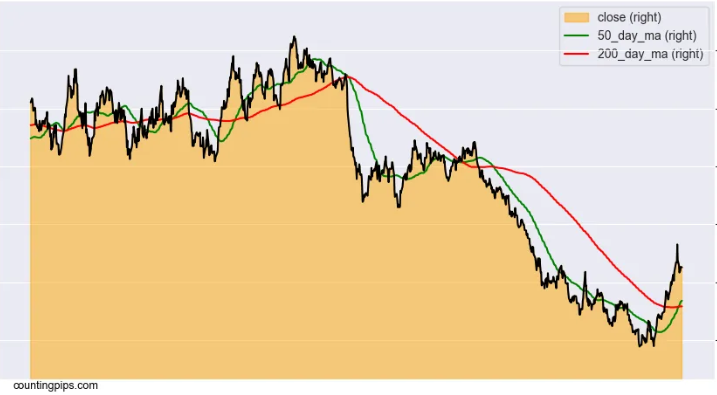Bonds investment that everyone should understand.
Types of risk of bonds
When most people come into contact with bonds, they use the wishful thinking of "I have an IOU, but I can't get away with the money." But it is true that many investors have flipped their cars in the bond market.
"all operations that ignore risks and only look at returns are hooligans" is the truth drawn by countless creditors and shareholders after a long period of great joy and sorrow. Bond investment is no exception, since there is a proud return on bank deposits, it must be accompanied by ups and downs.
 (bond price chart, photo source: CountingPips Global)
(bond price chart, photo source: CountingPips Global)
Why did bond prices fall? This article will answer your questions about risk. Follow Niu Niu Ollie. Here!
Generally speaking, the risk of bonds comes from interest rate changes, reinvestment, macro level and corporate credit default.
01 interest rate risk: the ancestor of all "evils"
Niuniu nagged repeatedly before that the fundamental reason for affecting bond prices was the change in market interest rates. If you still have "the interest rate on the bond can still float?" "this kind of rookie is confused, Niuniu suggests looking back first."the price of the bond"Consolidate it.
There is a negative correlation between market interest rates and bond prices. To put it simply, bond prices fall when interest rates rise. If you happen to encounter a rise in market interest rates while you are holding bonds, your bonds have already lost their face value. Under the restlessness of the market interest rate, the promise of making money is gradually drifting away, the excitement is for savings users, and the hearts of debtors are broken.

Of course, if market interest rates go down, investors can sit back and wait for attractive spreads. This is the main reason why the bond market has strengthened in the past two years-the global interest rate reduction cycle has begun, and governments have adopted loose monetary and fiscal policies, causing interest rates to fall, thus driving the bond market to go bull.
The reason why interest rate risk is the source of all "evil" is that it always comes out with a group of younger brothers-reinvestment risk, macro risk, and so on, trying to cheat you out of your income.
02 reinvestment risk: the price of a change of heart
The so-called reinvestment risk is the loss suffered by the return of reinvestment which is lower than that of the original product under the background of low market interest rate.
It's like you hoarded a pile of cosmetics during the sale and sold them at a high price after the sale. Then you suddenly want to buy another one for your own use, but there are no low-priced products on the market.
Now Niuniu has two products: an is 180 days, the annualized rate of return is 7%, the annualized rate of return is 90%, and the annualized rate of return is also 7%. Which one would you choose?

B seems more attractive. Because in the ideal situation, after B expires, withdraws the principal and interest, buys a B product, the capital disposition is more flexible. That's quite witty. But if after withdrawing the principal and interest, you find that there are no more than 7% of the products on the market to invest in, do you want to grieve for going the wrong way?
03 macro risk: a behemoth that cannot be avoided
Now that you have the ambition to dig for the Nuggets around the world, you have to bear the blow from all over the world. In the complex capital markets, one bat can trigger a global collapse, and some macro risks will affect all asset allocation.
Example 1: Niuniu wants to sell its bonds at a high price, but can't find a buyer who is willing to pay a reasonable price in the short term.
Only by having a low-price sale or missing this point in time can someone be willing to take the offer.
Example 2: Niuniu is complacent about buying corporate bonds with an annualized rate of 5%, but finds that the inflation rate this year is 5%. Isn't interest payment eroded by inflation?.
Example 3: Niuniu buys US dollar bonds with RMB and gets caught up in selling-the exchange rate is constantly changing, when will it be more profitable to recover?
This is really miserable, which has been destroyed by "liquidity risk", "inflation risk" and "currency risk" respectively. As ordinary creditors who are unable to control the overall situation, they should usually pay more attention to the hot spots of the market to speculate on the future trend, close their eyes and invest in bonds for a while, and losses come to the crematorium.
04 company breach of contract: early warning of scum male presence
Among the many risks, "credit risk" is the most speechless. Originally, it is easy to borrow and repay the benefits of both parties, but there are always issuers who risk being killed by mouth to play scoundrels and fail to pay interest or principal on time, thus bringing losses to investors.
Of course, corporate credit risk can be avoided, credit rating agencies through the rating of bonds to prompt its default risk. Niuniu will introduce this "mine-expelling" artifact in a later article.
Conclusion
People who are really not afraid of risks are those who have knowledge in mind, grasp hot spots in real time and have psychological expectations before investment. Be vigilant, be prepared for thinking, and be prepared for trouble.
